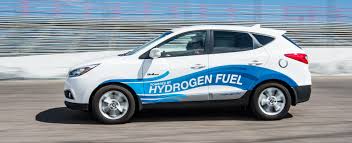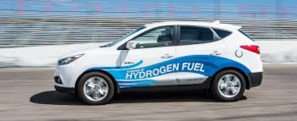While battery power is the most promising technology for the future of car technology, hydrogen could be a viable alternative.
This is the view of major automakers like BMW and Audi. They are currently developing prototypes for hydrogen fuel-cell passenger vehicles alongside their fleets.
They are betting on the possibility that political winds will shift towards hydrogen, in an industry shaped early by Tesla's decision for battery-powered clean cars.
Germany, the global auto hub, is under intense scrutiny. It has already invested billions in hydrogen fuel in steel and chemical sectors to meet climate targets. Closely fought elections this month could see Greens join the coalition government and push the technology further.
BMW, Germany's largest proponent of hydrogen among carmakers, is charting a course to a mass-market model by 2030. It also plans to shift hydrogen policies in Europe, China and elsewhere in the world's largest automotive market.
A hydrogen prototype car has been developed by the Munich-based premium player. It is based on the X5 SUV. The project was partially funded by Germany's government.
Jurgen Guldner (BMW vice president) told Reuters that the company would build a test vehicle of 100 cars by 2022.
He said that "whether this (technology is driven by politics) or demand, it will be ready with products," and added that his team is already developing the next generation of vehicles.
He said, "We are on the brink of getting there and that we are really confident we'll see breakthroughs in this decade."
The premium brand VW Audi told Reuters that it had more than 100 engineers and mechanics who were conducting research on hydrogen fuel cells for the Volkswagen Group. They also had built a few prototypes.
Because batteries are too heavy to be used in long-distance commercial vehicles, hydrogen is considered a sure thing by some of the largest truckmakers around the world, including Daimler AG unit Daimler Trucks, Volvo Trucks, and Hyundai.
However, fuel cell technology is too expensive for mass-market cars. It involves hydrogen passing through a catalyst to produce electricity. The cells are expensive and complex. Infrastructure is also more limited than that of battery recharging.
Even though hydrogen is far behind the market in terms of affordability, some technology champions like Germany's Greens favor battery-powered passenger cars as they are the most efficient way to achieve their main goal of decarbonising transportation.
However, the Greens support the use of hydrogen fuel to power ships and planes. They want to make huge investments in "green" hydrogen that is only produced from renewable resources.
Stefan Gelbhaar (the party's spokesperson for transport policy in the Bundestag) stated that "Hydrogen" will play an important role in transport.
Politics can be unpredictable, however. Diesel went from being a saint to a sinner after the Dieselgate emissions-cheating scandal at Volkswagen. This was revealed in 2015. Hydrogen technology is seen by some carmakers as an insurance policy, as the EU aims to ban fossil-fuel cars starting in 2035.
Daimler announced last year that it would cease production of the Mercedes-Benz GLCF-CELL, a hydrogen fuel-cell SUV. However, a source with knowledge of company plans stated that the project could be easily revived if the European Commission, or a German government with Green participation, decides to promote hydrogen cars.
When asked about this approach, Jorg Burzer (Daimler's head for production) stated that they are focusing first on (battery-electric), but that they work closely with their truck guys.
(Source:www.autobala.com)
This is the view of major automakers like BMW and Audi. They are currently developing prototypes for hydrogen fuel-cell passenger vehicles alongside their fleets.
They are betting on the possibility that political winds will shift towards hydrogen, in an industry shaped early by Tesla's decision for battery-powered clean cars.
Germany, the global auto hub, is under intense scrutiny. It has already invested billions in hydrogen fuel in steel and chemical sectors to meet climate targets. Closely fought elections this month could see Greens join the coalition government and push the technology further.
BMW, Germany's largest proponent of hydrogen among carmakers, is charting a course to a mass-market model by 2030. It also plans to shift hydrogen policies in Europe, China and elsewhere in the world's largest automotive market.
A hydrogen prototype car has been developed by the Munich-based premium player. It is based on the X5 SUV. The project was partially funded by Germany's government.
Jurgen Guldner (BMW vice president) told Reuters that the company would build a test vehicle of 100 cars by 2022.
He said that "whether this (technology is driven by politics) or demand, it will be ready with products," and added that his team is already developing the next generation of vehicles.
He said, "We are on the brink of getting there and that we are really confident we'll see breakthroughs in this decade."
The premium brand VW Audi told Reuters that it had more than 100 engineers and mechanics who were conducting research on hydrogen fuel cells for the Volkswagen Group. They also had built a few prototypes.
Because batteries are too heavy to be used in long-distance commercial vehicles, hydrogen is considered a sure thing by some of the largest truckmakers around the world, including Daimler AG unit Daimler Trucks, Volvo Trucks, and Hyundai.
However, fuel cell technology is too expensive for mass-market cars. It involves hydrogen passing through a catalyst to produce electricity. The cells are expensive and complex. Infrastructure is also more limited than that of battery recharging.
Even though hydrogen is far behind the market in terms of affordability, some technology champions like Germany's Greens favor battery-powered passenger cars as they are the most efficient way to achieve their main goal of decarbonising transportation.
However, the Greens support the use of hydrogen fuel to power ships and planes. They want to make huge investments in "green" hydrogen that is only produced from renewable resources.
Stefan Gelbhaar (the party's spokesperson for transport policy in the Bundestag) stated that "Hydrogen" will play an important role in transport.
Politics can be unpredictable, however. Diesel went from being a saint to a sinner after the Dieselgate emissions-cheating scandal at Volkswagen. This was revealed in 2015. Hydrogen technology is seen by some carmakers as an insurance policy, as the EU aims to ban fossil-fuel cars starting in 2035.
Daimler announced last year that it would cease production of the Mercedes-Benz GLCF-CELL, a hydrogen fuel-cell SUV. However, a source with knowledge of company plans stated that the project could be easily revived if the European Commission, or a German government with Green participation, decides to promote hydrogen cars.
When asked about this approach, Jorg Burzer (Daimler's head for production) stated that they are focusing first on (battery-electric), but that they work closely with their truck guys.
(Source:www.autobala.com)






